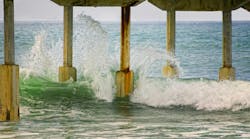A University of Florida study found that ponds lose more carbon via gas than they store in the muck.
More specifically, Florida has 76,000 ponds that store carbon, but a lot of it escapes into the atmosphere, reported the study. The goal of the research is to also inform estimates of how much carbon is entering the atmosphere from these ponds on a regional basis, according to Mary Lusk, faculty member at the UF/IFAS Gulf Coast Research and Education Center.
"That finding means some ponds are doing us an ecosystem 'disservice,'" said Lusk, reported Science Daily. "Globally, we expect that as urbanization continues, there will be more and more of these small human-made ponds in urban landscapes. Then, once people start to understand that better, we hope they will take storm water ponds into account for policies related to carbon control. Storm water ponds are everywhere in Florida. But they are understudied in terms of how they are impacting local ecosystems. Because they are human-made parts of the landscape, they sort of get overlooked, and people might assume they're not very important ecologically."
The study originally wanted to focus on nitrogen and phosphorus in ponds, according to Lusk, but one of her graduate students, Audrey Goeckner, wanted to study carbon, reported Science Daily. Goeckner created a way to measure the amount of carbon leaving ponds.
She took two canoes (attached to each other) into the ponds, and she and a lab technician each sat in one to balance the weight. After, they collected muck from the bottom of the ponds and measured the depth of the muck above the sandy layer of sediment, reported Science Direct. The results showed when the pond was constructed and the amount of organic carbon stored in it, which then the amount of carbon buried in the ponds.
Then, she modified a chamber to measure these gasses from the surface of the ponds.
The results showed that the quantity of these gasses that escapes from the ponds each year and compared carbon stored in the pond muck vs. carbon lost via gaseous loss. This showed that "ponds give off more carbon than they store and that the amount lost changes over the lifetime of a pond," reported Science Daily.
According to Goeckner, as ponds age, "their sediment and biogeochemical properties may promote the amount of carbon stored, rather than emitted as a gas."
"Our results suggest that when they're new, they emit large proportions of carbon from the landscape and potentially increase storage over time," Lusk said. "This means the older ponds are doing less of an ecosystem disservice to us than the younger ponds. But if you think about the rate of new housing development in Florida, and how fast new storm water ponds are being built in all that new development, it means we will always have a fresh new batch of young ponds that are just pumping carbon out to the atmosphere."






